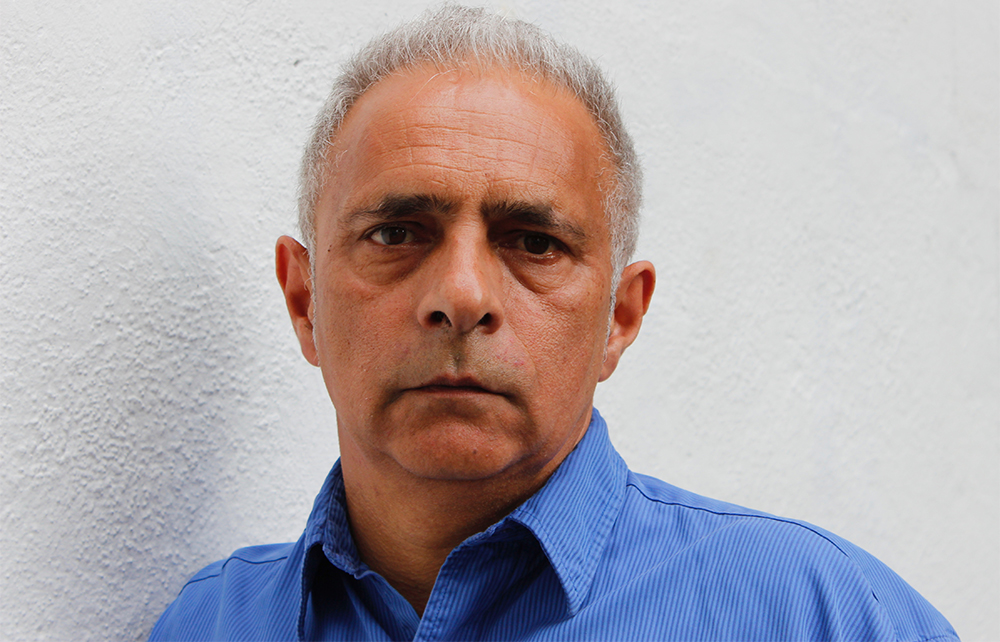You’d think a book about a paralysed man lying in hospital for a year would be bound to be depressing. It never is. Hanif Kureishi is such an exhilarating writer that you read agog even when he’s describing having his nappies changed or fingers stuck up his bottom.
It all started on Boxing Day 2022 when he was sitting watching television in his girlfriend Isabella’s flat in Rome. He wasn’t drunk, he wasn’t stoned, but suddenly he felt a bit dizzy, put his head between his knees and fell off the sofa. In doing so, he somehow broke his neck and became tetraplegic. As a result, he cannot move his arms or legs, he cannot feed himself or scratch his nose or hold a pen. If he cries, he cannot wipe away his tears. But luckily he can still talk, and that is how he has produced Shattered, by dictating it to his son Carlo. He says: ‘I am determined to keep writing, it has never mattered to me more.’
His narrative starts on 6 January 2023, less than a fortnight after his accident, in the Gemelli Hospital, Rome. For the first few days he was too traumatised to speak, but now his twin sons, Carlo and Sachin, have come to visit and he has decided to dictate his thoughts to Carlo, ‘to give form to this chaos I have fallen into, to stop myself from dying inside’. On 17 January he is moved to a bigger, better hospital, the Santa Lucia, where he is hoisted into a wheelchair and taken to the gym. He has never been to a gym before and loves it. He adores Italian men – the physios are all so handsome – and decides to become an Italian citizen. He also decides to propose to Isabella and, much to his surprise, she accepts. ‘As I prepare for life as a married man, I am wondering what colour to paint my nails.’
He intersperses his hospital diary with reminiscences about his childhood and youth. He adored his father, the Buddha of Suburbia, but his mother was ‘the most boring person I ever met… She had not the slightest interest in charming or entertaining anyone, least of all me’. He was bullied at school, where he was called ‘Paki’ or ‘Shit-face’, so he decided to call himself a writer – even before he had written anything.
His first published efforts were pornographic stories for skin mags such as Mayfair, but he also wrote plays and got himself an internship at the Royal Court Theatre, where he came to know Samuel Beckett, drinking in the bar. ‘Contrary to popular belief, he wasn’t a miserable git. If a young woman approached him with a pile of his books, Sam would look cheerful and sign them gladly.’ Another great event was meeting Salman Rushdie in a bookshop and Rushdie giving him a copy of Midnight’s Children. He read it in one sitting, walked down to the river, drank a bottle of wine and then read it all over again. Rushdie became a good friend and has written to him every day since his accident.
The irresistible thing about Kureishi, it soon emerges, is that he is passionately interested in other people, and ‘I have to say that becoming paralysed is a great way to meet new people’. In fact he reckons he has made more friends in hospital than in the past five years. One of his new hospital friends, Miss S, tells him that ‘hospital is often painful and boring, but it is usually interesting’, and so it is when Kureishi is writing.
In June he is flown back to London. From the taxi over Hammersmith flyover he can almost see his house and finds it heartbreaking. He wants to go home, not to another hospital. But he is taken to the Chelsea and Westminster, where he is put in a side room off the dementia ward and not allowed to mix with other patients because it turns out he has an antibiotic-resistant bug. He loses his appetite and gets depressed. The doctors put him on anti-depressants though he has no faith in them – he prefers to have weekly phone sessions with his psychoanalyst, who he has been going to for almost 30 years.
Then he is moved to the Charing Cross hospital, where lots of friends come to visit. Carlo is pleased because
the liberal elite are in and out, crossing over with one another… Apparently, I’ve got quite a party going on here, but since I refuse to be cheered up, I can only vaguely enjoy it.
Kureishi gets particularly cross when visitors talk about their holidays and say they’re off to Tuscany for two weeks but will visit him when they get back. ‘I’m going nowhere. No wonder I feel like shit. Fuck them, their holidays, and their fucking happiness.’
His house is only 15 minutes away and he longs to be there, but first he has to stay in a fifth hospital, a spinal rehab place in Stanmore, north London, which has good physio facilities but is a long way for visitors to come. He makes friends with a fellow patient, Jon, who was recently injured in a rock-climbing accident. But, unlike Kureishi, Jon is bent on suicide. He reckons that if he can wheel himself into the garden unobserved, he can die of hypothermia in 12 minutes. But Kureishi points out that the weather is unusually mild and he could be sitting out there for hours.
On 20 December, almost exactly a year after his accident, Kureishi is finally back home, though of course it is different. The living room has been converted into a bedroom plus bathroom and there is a bedroom at the top of the house for a live-in carer. The council also sends a succession of visiting carers to get him into and out of bed. They are all immigrants, and he notes:
Having lived and worked in a white world for the best part of 40 years, most of my adult life, I am back where I began with my father, his family and friends.
The looming fear is that, with tax cuts pending, the number of his NHS carers could be reduced. ‘There is a risk I may have to sell my house in order to get my arse wiped.’
Meanwhile, he dictates his book to Carlo for three hours every morning and Isabella takes him to Tesco in the afternoons where he enjoys whizzing about the aisles. But he worries about Isabella having to do all the cooking and housework, and feels guilty that ‘my contribution is zilch’. They spend Christmas Day with Sachin and Carlo’s mother Tracey, who has been a great support throughout even though he left her when the twins were only two. He remembers his last Christmas with Isabella’s family in Rome, the day before he fell on his head and was changed forever:
My world has taken a zig where previously it zagged; it has been smashed, remade and altered, and there is nothing I can do about it. But I will not go under; I will make something of this.
He has indeed. I’ve never felt tempted to use the word ‘inspirational’ about a book, and promise I never will again, but it’s the only word I can think of to describe Shattered.







Comments